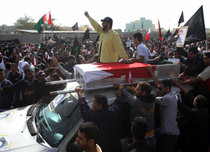Azerbaijan, Baku, March 17 /Trend/
A Bahraini minister and several Shiite MPs submitted their resignation Wednesday amid reports that choosing to stay in their positions would have endangered their and their families' lives, Al Arabiya reported.
Housing Minister Majid al-Alawi, who is also former minister of labor, resigned along with three members of the Consultative Council, Bahrain's upper house of parliament-Hadi al-Halwaji, Khaled al-Maskati, and Dr. Nada Hafaz, who is also former minister of health.
The resignations of the Shiite officials were accompanied by unconfirmed reports that they received death threats and were told that their families and properties would be in danger if they stay.
According to the reports, the four officials were accused of close ties to the Sunni regime that is currently facing a massive uprising by the Shiite population. The MPs are, in fact, appointed by royal decree like all 40 members of the Consultative Council.
The Council of Representatives, Bahrain's lower house of parliament, was also swept with a wave of resignations as 18 Shiite MPs from al-Wefaq National Islamic Society, the largest party in Bahrain, quit in the wake of the protests that started on February 14 to demand more freedom for the majority Shiite population.
The 18 MPs, observers say, resigned for fear that will lose their popularity among the Shiite protestors for holding government positions. The resignation of Wefaq MPs came two months after their representation in the council increased as they won 45% of the council's seats in the October 2010 elections.
The Wefaq refused with six other political parties to take part in the national dialogue led by Bahraini Crown Prince Salman bin Hamad Al Khalifa unless 12 conditions, among them toppling the government and annulling the constitution, are met.
The conditions were seen as "crippling" by several bodies and anti-government protests continued with health and educational institutions sabotaged, roads blocked, and security destabilized.
In an attempt to pacify the protestors, Bahraini king Hamad ibn Isa Al Khalifa declared a few days ago an amnesty for operatives of an armed network that was dismantled on August 13, 2010. According to security reports, the network was comprised of members and leaders of Shiite movements like Haq, Ahrar al-Bahrain, and al-Wafaa.






